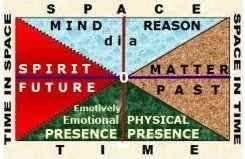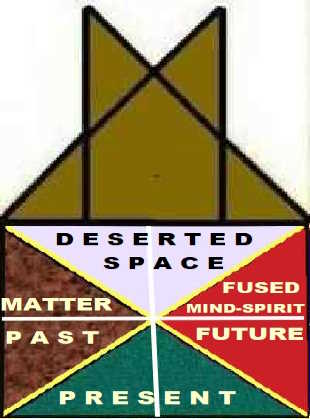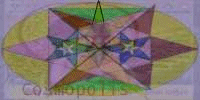humane, creatively individual way of thinking

Dialectical Creative Framework for Orientation in the Eternity of Times DIA Infinity of Spaces
VERSUS

Methodological Reasoning DIA Comprehending of the (Recti)linear Space and Time, understood AS SOMETHING OUTSIDE OF US
This way of thinking is based on a dialectical understanding of time and space, within which the conjoined twins of the current ruling understanding of the medium of space (fused spirit, mind - reason) were again separated and placed in their right places, in order to be reinstalled and re-established the medium of this dialectical understanding of space: mind dia reason. In addition, within the rectilinear understanding of time, instead of the group medium - the present, a dialectical medium of time was introduced: the emotively emotional dia physical (bodily) presence of the individual. On the basis of this dialectically redefined time DIA space, the Dialectical Interactive Approach is developed as an alternative to the ruling dual [AND - AND] → bipolar [OR - OR] DIA selected [OR] binary way of thinking: Yes - No, Truth - Lie, Black - White, With Us - Against Us, All - Nothing.... All of the aforementioned enables the feasibility of separation, liberation, and true emancipation of the individual (human being) from the shackles of various types of group dia mob ("We") way of thinking, which actually represents the basis for the functioning of various natiocratic types of political society organization.
For proper orientation and navigation in the labyrinth of a rectilinear understanding of time and space, there is no way out of the world of natiocracy until this more humane, creatively individual way of thinking prevails in the considered social community, i.e. the established civilization. Of course, all this if the well-known natiocratic aimless roaming within this labyrinth was excluded, where even (small) ups and downs (changes) were perceived and represented as some kind of "significant" progress and improvement for its inhabitants, despite the fact that in that package were transferred and skilfully wrapped essences of the old natiocratic orders, as will be shown in the creative article dedicated to the Newly Established Natiocratic Social and Economic Order: Debtism.
On the other hand, the dialectic interactive approach, represented by the dialectic quartet of the thesis, antithesis, and synthesis DIA renewed thesis [3 dia 1: their unity and oneness] offers a wide creative working framework for a FAR MORE HUMAN and HUMAN-LOVING collision of ideas, thoughts ... within this reintroduced spatial MEDIA [ mind dia reason ] DIA appropriate medium of time [medium of thy emotively emotional presence dia physical presence], using all available linguistic dialects of this revived methodological approach. In short, in accordance with this Human, Creatively Individual Way of Thinking and Deliberation, the renewed thesis is contradicted, i.e. supplemented, complemented, and completed with a modified antithesis supported by strong arguments, which will result in a dialectical synthesis DIA a renewed thesis (preferably) at a higher level of this dialectical understanding of time and space, and so on, until a temporary conclusion of that reexamined time, in time DIA space is reached.

In full agreement with the presented dialectical interactive approach, this temporary conclusion will sooner or later be challenged and contradicted, because absolute truth and appropriate knowledge are in the hands of God and no one else. In other words, to continue this endlessly creative confrontation of ideas and thoughts within this broad common-sense creative working framework, synthesis DIA the renewed thesis of this current temporary conclusion will be confronted with the renewed and supplemented antithesis of mature time DIA space. In short, instead of putting in focus the various IMPERSONAL group categories, a paradigmatic shift of the way of thinking was made, where the human and humane beings with their needs, wants and wishes are in the centre of attention of all participating actors. The role of creative abilities was clearly emphasised, understood in terms of being adequately paid (including payment by the issued shares), instead of being cheaply exploited through fixed salaries by the top management and owners (investors).
distinguishing good from evil, as a prerequisite for successful functioning an established society and family
From all of the above, it clearly follows that for the successful functioning of the dialectical interactive approach, it is necessary to cultivate individuality DIA humanization, as one of the foundations and levers for the future progress of the established civilization, society, and family, as well as other ways of the social organization of its inhabitants, especially in those where evil (evil, bad, wrong choices, and paths) are present in a significant degree. Apart from a harsh critique of the purposeful production of vulgar minds DIA the SIMPLE(ST) ONES, in order to be satisfied the narrow-minded interests of ruling natiocratic elite, this creator of knowledge also stressed the importance of CONTINUOUSLY increasing the level of development of the consciousness of its inhabitants. In the living reality, this is manifested by the recognisable human prick (pangs) of CONSCIENCE, which actually tells someone, whether it was handled or done in a good or bad (evil) way, whether something is of a good or evil nature and the like.
In order to be satisfied these higher humane interests, the distinguishing GOOD from evil plays the central role during any kind of the interactively creative debate using this methodological approach: dialectic interactive approach. From the point of view of this methodological approach, the distinction between good and evil, that is, the distinction between right and wrong, is more important than any other considered dialectical concept, even if it is about such buzzword concepts as truth, trust, love... At the same time, the lack of a clear, unambiguous, indisputable, and impartial way and method for distinguishing good from evil is the main stumbling block, as well as the main cause of related disagreements when making correct or valid decisions, judgments, or making a reasonable conclusion, which will satisfy all and everyone during the (creative) consideration of some dialectical content.
Regardless of all this said, as sooner this issue was resolved in accordance with the basic principles of the developed dialectical interactive approach, as more fruitful its creative outcome will be. For this reason, if it is not feasible to be established what is good and what is bad (evil), then it should be determined, understood in terms of the basic principles of the developed dialectical interactive approach, what is better from the available, accessible choices, ways, ..., accordingly in the utmost sense, WHAT IS LESS EVIL in a particular scenario in time DIA the appropriate situation in space. In full agreement with this Human, Individual Way of Thinking, while distinguishing good from evil, every human and human-loving being tries to reduce (and not increase) the level of evil committed and damage caused in the considered social context by its actions and decisions.
Keep in mind, each established societal order requires the suitable level of the developed consciousness of its inhabitants, which is externally manifested through the relation between the good and evil in a concrete society. In short, when the utmost limits of this gray zone of confrontation between good and evil in a society are not set, then the vulgarity, anarchy, and demonstration of various natiocratic freedoms including the creative ones as well will spread to these disputed areas until the entire realm of good has been occupied. From all of the above, it clearly follows that only in this human and individual way of distinguishing Good from evil does it make sense to give greater autonomy and independence to workers and employees during the launched creative, working, and business processes and making appropriate decisions, or in the broader sense to provide the necessary conditions for freedom of speech, expression, and creative action, the right to vote for their citizens, or excercise of freedom of choice and free will in generall, as a prerequisite for successful functioning an established society, family, and other ways of socially organizing its inhabitants.










